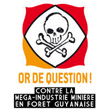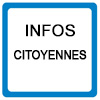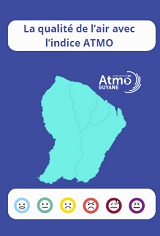Blada.com
jeudi 25 décembre
Boîtes aux lettres
Courrier des lecteurs
Petites annonces
Emploi / Formation
Covoiturage
Infos citoyennes
Infos citoyennes
25/10/21
Montagne d’or : les investisseurs réclament 4 milliards d'euros à la France
 Le projet aurifère de la Montagne d’Or fait à nouveau parler de lui : l’entreprise Nordgold réclame 4 milliards € à la France en réparation de la décision du gouvernement français de ne pas prolonger la concession minière en question. Ce contentieux est ouvert devant un tribunal arbitral dans le cadre du Traité bilatéral de protection des investissements entre la France et la Russie qui est entré en vigueur en 1991. Les collectif Stop CETA-Mercosur et Or de Question apportent leur plein et entier soutien aux organisations et citoyens mobilisés depuis des années contre ce projet et renouvellent leur appel consistant à débrancher le plus rapidement possible ces mécanismes de protection des investisseurs (ISDS) qui font obstacle au pouvoir de réglementation des États.
Le projet aurifère de la Montagne d’Or fait à nouveau parler de lui : l’entreprise Nordgold réclame 4 milliards € à la France en réparation de la décision du gouvernement français de ne pas prolonger la concession minière en question. Ce contentieux est ouvert devant un tribunal arbitral dans le cadre du Traité bilatéral de protection des investissements entre la France et la Russie qui est entré en vigueur en 1991. Les collectif Stop CETA-Mercosur et Or de Question apportent leur plein et entier soutien aux organisations et citoyens mobilisés depuis des années contre ce projet et renouvellent leur appel consistant à débrancher le plus rapidement possible ces mécanismes de protection des investisseurs (ISDS) qui font obstacle au pouvoir de réglementation des États.
Fruit de la mobilisation citoyenne en Guyane et en métropole, la décision du gouvernement français du printemps 2019 consistant à ne pas renouveler la concession minière sur laquelle est envisagé le projet industriel de la Montagne d’Or est désormais l’objet d’un contentieux arbitral enclenché par l’entreprise russe Nordgold et les deux holdings Severgroup et KN Holdings qui la possèdent, et qui sont elles-mêmes détenues par le même actionnaire Alexeï Mordachov. Ils réclament près de 4 milliards d’euros en réparation à l’annulation d’un projet dont elle espérait qu’il rapporterait au moins 3 milliards d’euros à terme, mais dont la première brique n’a jamais été posée.
Comme le montre une analyse détaillée produite par l’Aitec et le T-lab, ce cas illustre d’abord les errements et manquements des gouvernements français successifs, et particulièrement d’Emmanuel Macron, qui ont trop longtemps soutenu et encouragé ce projet d’exploitation aurifère en Guyane. Ce soutien inconditionnel affiché au moins jusqu’à l’automne 2018, offre un argument de taille aux investisseurs russes devant le tribunal arbitral : le gouvernement risque d’avoir le plus grand mal à expliquer comment Emmanuel Macron a pu présenter ce projet comme le porte drapeau du renouveau de la Mine en France - encourageant ainsi la poursuite des recherches et des travaux préparatoires-, puis considérer à partir de 2019 qu’il ne devait plus voir le jour.
Dès lors que les investisseurs l’ont demandé, cet arbitrage est inévitable. Il est d’autant plus regrettable qu’il s’appuie sur un traité de protection des investissements particulièrement favorable aux investisseurs : il ne comporte aucune disposition limitant leur accès à ce mécanisme, par exemple l’obligation d’attendre l’épuisement de tous les recours devant les tribunaux nationaux - ce qui est le cas de la Montagne d’Or puisque le Conseil d’État doit encore statuer sur une procédure en cours. Et il n’offre aucune exception particulière qui préserverait l’espace de réglementation nécessaire à la France et la Russie pour la protection de la santé publique, de l’environnement ou du climat.
Sauf à ce que le panel estime que le contentieux est irrecevable, ou requiert d’attendre la décision du Conseil d’État avant d’engager la procédure, compte-tenu des éléments disponibles, la France joue gros : Paris ne pourra éviter le litige et le risque de dédommagements énormes qu’en négociant un arrangement financier. L’opinion publique en sera-t-elle informée ? Rien n’est moins sûr : en 2008, après l’abandon par Nicolas Sarkozy du projet minier de la compagnie canadienne Iamgold à Kaw, la Guyane avait déjà connu un chantage similaire. Ce cas qui avait été soldé par un arrangement politique et financier dont les citoyens n’ont jamais connu les détails.
Les errements d’un gouvernement désireux de relancer la filière aurifère quel qu’en soit le coût écologique pourraient conduire au gaspillage de centaines de millions d’euros en réparation de l’annulation d’un projet qui aurait dû être stoppé bien plus tôt. L’arbitrage Investisseur-État est particulièrement prisé dans l’industrie extractive, et a déjà donné lieu à des milliards de dommages accordés à des entreprises qui n’avaient même pas commencé à forer, au Pakistan ou en Colombie par exemple. Or compte-tenu de l’urgence climatique, des enjeux de protection de biodiversité, des besoins de services publics étendus, qui exigent tous bien souvent de remettre en cause les droits acquis des industriels privés (éliminer les énergies fossiles, restreindre les activités industrielles, socialiser des activités de services etc), ce genre de contentieux ne peut que se multiplier. Compte-tenu de l’appétit des entreprises minières en Guyane et dans les pays voisins, ce sont la survie de l’Amazonie et la préservation de la planète qui sont en jeu.
C’est d’ailleurs la tendance observée à l’échelle planétaire depuis une quinzaine d’années : du Chili aux Pays-Bas, de la Roumanie à la Slovénie, il y a de plus en plus d’États poursuivis par des multinationales suite à des mesures touchant aux ressources, au climat ou aux services publics. Le contentieux enclenché par Nordgold est le premier de cette nature à concerner la France : la réforme du code minier, extrêmement tardive et pas pleinement satisfaisante, n’aura pas permis d’empêcher un tel recours. Ce contentieux doit conduire le gouvernement français au sursaut : il est urgent de débrancher, le plus rapidement possible en raison des clauses de survie qu’ils contiennent, ces mécanismes de protection des investisseurs (ISDS) qui font obstacle au pouvoir de réglementation des États. A commencer par le Traité sur la charte de l’énergie et le CETA.
The Gold Mountain gold project is talking about it again: the Nordgold company is demanding € 4 billion from France in compensation for the French government's decision not to extend the mining concession in question. This dispute is opened before an arbitral tribunal within the framework of the bilateral investment protection treaty between France and Russia which entered into force in 1991. The Stop CETA-Mercosur and "Or de Question" collective provide their full support to the organizations and citizens who have been mobilized for years against this project and renew their call to disconnect as quickly as possible these investor protection mechanisms (ISDS) which obstruct the regulatory power of states.
The result of citizen mobilization in French Guiana and in metropolitan France, the French government's decision in spring 2019 not to renew the mining concession on which the Golden Mountain industrial project is being considered is now the subject of litigation. arbitration initiated by the Russian company Nordgold and the two holdings Severgroup and KN Holdings which own it, and which are themselves held by the same shareholder Alexeï Mordachov. They are claiming nearly 4 billion euros in compensation for the cancellation of a project which she hoped would bring in at least 3 billion euros in time, but whose first brick was never laid.
As shown by a detailed analysis produced by Aitec and T-lab, this case first illustrates the mistakes and shortcomings of successive French governments, and particularly Emmanuel Macron, who have supported and encouraged this project for too long. gold mining in French Guiana. This unconditional support displayed at least until the fall of 2018, offers a strong argument to Russian investors before the arbitral tribunal: the government may have the greatest difficulty in explaining how Emmanuel Macron was able to present this project as it is. flag of the renewal of the mine in France - thus encouraging the continuation of research and preparatory work -, then consider from 2019 that it should no longer see the light of day.
As soon as investors demand it, this arbitrage is inevitable. It is all the more regrettable as it is based on an investment protection treaty that is particularly favorable to investors: it does not contain any provision limiting their access to this mechanism, for example the obligation to wait for everyone to exhaust themselves. appeals before national courts - which is the case with the Golden Mountain since the Council of State has yet to rule on an ongoing procedure. And it offers no specific exceptions that would preserve the regulatory space necessary for France and Russia to protect public health, the environment or the climate.
Unless the panel considers that the dispute is inadmissible, or requires waiting for the decision of the Council of State before initiating the procedure, given the available elements, France is playing big: Paris will not be able to avoid the dispute and the risk of huge compensation only by negotiating a financial arrangement. Will public opinion be informed? Nothing is less certain: in 2008, after the abandonment by Nicolas Sarkozy of the mining project of the Canadian company Iamgold in Kaw, French Guiana had already experienced similar blackmail. This case which had been settled by a political and financial arrangement of which the citizens never knew the details.
The mistakes of a government wishing to revive the gold industry regardless of the ecological cost could lead to the waste of hundreds of millions of euros in compensation for the cancellation of a project that should have been stopped much earlier. Investor-state arbitration is particularly popular in the extractive industry, and has already resulted in billions of damages awarded to companies that had not even started drilling, in Pakistan or Colombia for example. However, given the climate emergency, the challenges of protecting biodiversity, the needs for extended public services, which all often require that the acquired rights of private manufacturers be called into question (eliminating fossil fuels, restricting industrial activities, socialize service activities etc), this kind of litigation can only multiply. Given the appetite of mining companies in French Guiana and neighboring countries, it is the survival of the Amazon and the preservation of the planet that are at stake.
This is also the trend observed on a planetary scale for the past fifteen years: from Chile to the Netherlands, from Romania to Slovenia, there are more and more States pursued by multinationals following measures affecting resources, the climate or public services. The dispute initiated by Nordgold is the first of its kind to concern France: the reform of the mining code, extremely late and not fully satisfactory, will not have made it possible to prevent such an appeal. This dispute must lead the French government to a start: it is urgent to disconnect, as quickly as possible because of the survival clauses they contain, these investor protection mechanisms (ISDS) which obstruct the regulatory power of states. Starting with the Energy Charter Treaty and CETA.
Raccourcis


passer une petite annonce

passer une annonce de covoiturage


passer une annonce d’emploi







associations, postez vos actualités

participez au courrier des lecteurs
La Guyane c’est ici
La qualité de l’Air avec
ATMO
Photothèque

Lancements 2022
Vol 259 Ariane 5




